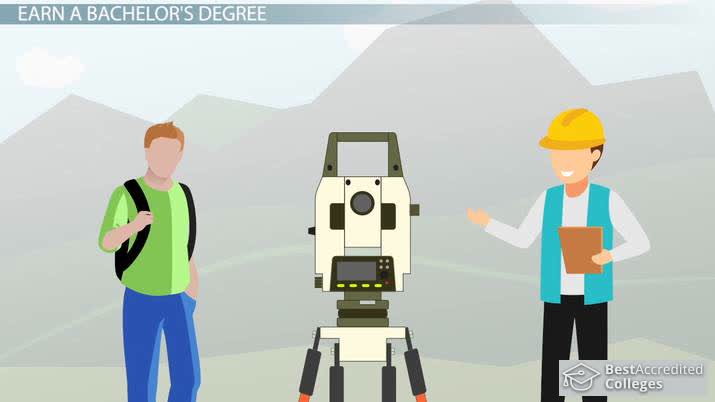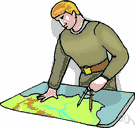Mon-Sat 9am-7pm




In career as cartographers, individuals collect and analyse geographical data such as population density, demographic characteristics, and precipitation patterns. It is the maps that help us travel from one location to another. Maps help us figure out where we are and how to get where we want to go. And most importantly, maps are possible because cartographers made them possible. Without cartographers, google maps would have been nothing but an incomplete dream. The reason why we are able to analyse the distance and route between two destinations is that we have maps to help us figure it out for us. Also, without cartographers, forget about the cab facilities that have now become an integral part of our lives. Students can pursue integrated cartography courses in India of five years such as (civil engineering + geotechnical engineering). to become a cartographer. Here, in this article, we will discuss the cartography job description, cartographer jobs, cartography courses in India, how to become a cartographer, cartographer jobs in India.

Individuals who opt for a career as a cartographer analyse and collect data from ground surveys, reports, aerial photographs, and satellite images to prepare thematic maps. In addition to this, a cartographer also prepares thematic maps in digital or graphic form to be used for social, environmental, political, business, educational, and design purposes. In career as cartographer, individuals are involved with different aspects of map-making such as scientific, technological, and artistic. Individuals who opt for a career as a cartographer are required to represent complex information in the form of diagrams, pie charts, and spreadsheets, as well as in the form of conventional maps. So how to become a cartographer and what does it take to become one?
Cartographers are required to undertake various physical aspects into consideration before beginning the map designing. During research, they are responsible for developing various processes and diagnosing methodologies in order to excel the scope of cartography for the particular section. Developing is one of the most crucial parts of their job and responsibilities whether it’s developing methodologies, procedures, samples, and other such things.
One of the most important parts of the cartographers’ job includes studying the project they are working on. They are required to constantly study and remain updated at each and every step of the project. They are responsible for studying the project, its scope in land development, limitations, efficiency that the project exhibits, and the consequences related to the project. From beginning to the end of the project, they are required to analyse each and every aspect of the research and ensure the resources utilized in the project are optimized at their best.
Cartographers are required to consult different professionals including other cartographers in order to meet certain requirements of the project they’re working on. For instance, political cartographers are required to meet and consult several research scientists working on the same project as them. Cultural cartographers are required to consult translators, language experts and professors in order to gain detailed information regarding the history or evolution of a particular language for a particular section of society.
Another important job of a cartographer involves teaching and guiding students with their interests and research around cartography. Various cartographers work as professors in universities guiding students with in-depth knowledge and understanding of cartography as a subject and further its application in career development. They also teach and train students interested in becoming cartographers. The cartography professors teach various subjects such as political cartography, physical cartography, cultural cartography, and educational cartography.
Path 1:
Std XII
Stream:Any
Graduate degree
Geography
Post Grad Dip
Geographical Cartography
Goal
Cartographer
Path 2:
Std XII
Stream:Sc PCM
Graduation
B.Sc*
Entrance Test
Geographical Cartography
Post Grad Dip
Geo Cartography
Goal
Cartographer
Path 3:
Std XII
Stream:Sc PCM
Graduation
B.Sc Geography
Entrance Test
Geographical Cartography
Post Grad Dip
Geog Cartography
Goal
Cartographer
Path 4:
Std XII
Stream :Sc PCM
Graduation
B.Sc Geography
Post Graduation
M.Sc Cartography
Goal
Cartographer
Path 5:
Std XII
Stream: Sc PCM
Graduation
B.E/ B.Tech
Geo-informatics
Goal
Cartographer
Path 6:
Std XII
Stream: Sc PCM
Graduation
B.E/B.Tech
Remote Sensing
Post Graduation
M.Tech
Remote Sensing/GIS
Goal
Cartographer
Cartographer intern: Cartographer interns are required to be studying for a Master's, Bachelor's level of geosciences engineering degree or geoscience engineering courses. A cartographer intern must possess genuine interest in engineering design related to environmental engineering. As a cartographer intern, they are required to represent complex information in the form of diagrams, pie charts, and spreadsheets, as well as in the form of conventional maps.
Junior cartographer: After directly graduating from the relevant engineering field, he/she can start working as a junior cartographer in any of the various organisations. As a cartographer, you’ll collect and analyse geographical data such as population density, demographic characteristics, and precipitation patterns. A cartographer analyses and collects data from ground surveys, reports, aerial photographs, and satellite images to prepare thematic maps.
Senior cartographer: Cartographers might spend most of their time working in office or they might be required to typically do some fieldwork in order to collect and verify data used in creating maps. A cartographer is responsible to control, plan, and manage the overall strategy while working on any project. Therefore, one must be profound in planning and managing the complete process from starting to the end. As a cartographer, one must be able to plan and create an effective strategy, should have decision making skills, leadership quality, problem solving skills, should know how to manage time, how to control and motivate the team while leading them.
Average Base Salary
Average Hourly Rate
Average Bonus
800k900k1.0M1.1M1.2M1.3MEntry?7,79,892Senior?13,56,722Average?10,80,067
Compensation Data Based on Experience
The average cartographer gross salary in India is ?10,80,067 or an equivalent hourly rate of ?519. In addition, they earn an average bonus of ?25,166. Salary estimates based on salary survey data collected directly from employers and anonymous employees in India. An entry level cartographer (1-3 years of experience) earns an average salary of ?7,79,892. On the other end, a senior level cartographer (8+ years of experience) earns an average salary of ?13,56,722.
Pros:
Cons:
:
There are various advantages to working as a cartographer. Here are some benefits explained:
Cartographers often work in a hands-on capacity, producing work for practical purposes. These professionals typically employ a combination of creativity and logical thinking in their role to analyze information, create rules and organize visual data. For those candidates who enjoy problem-solving and generating innovative solutions, this type of work can be highly compelling.
A career as a cartographer typically requires professionals to work in a results-oriented environment. Therefore, in this role, it can be helpful to have a certain level of dependability, initiative, attention to detail and adaptability. If you value the ability to work toward tangible achievements, a career as a cartographer may be of interest to you.
Cartographers often work independently as they perform their day-to-day duties. While cartographers may work alongside others in a limited capacity, these professionals may spend the bulk of their time alone, compiling data from various sources and synthesizing this information to create maps or mapping systems. This type of environment can be highly beneficial for those candidates who prefer to work independently rather than in a heavily team-focused environment.
Cartographers may have the ability to earn high rates of compensation depending on their level of education, location and place of employment. The national average salary for a cartographer is $66,851 per year, with the potential to earn various employer-sponsored benefits like health, dental and vision insurance, paid time off (PTO), tuition reimbursement and flexible spending accounts. In some cities, cartographers may earn significantly more due to a higher demand for these professionals.
:
While there are many advantages to this career path, working as a cartographer also presents some disadvantages depending on your preferences as a professional. Here are some cons of being a cartographer explained:
Since working as a cartographer often entails a significant amount of independent work, these professionals typically have few opportunities to mentor or teach others. If you're a professional who values working alongside colleagues and interacting with junior team members, this type of work may not be the best fit for you. There are alternative geoinformatics careers available through which professionals can work in a mentorship capacity.
Prospective cartographers often have to meet a high barrier to entry when pursuing their careers. Candidates for cartography roles typically must earn a minimum of a postsecondary certificate or bachelor's degree in fields like geographic information science, engineering or mathematics. They also usually pursue hands-on learning opportunities like internships to gain a foundation of experience in their field prior to earning licensure.
Cartographers frequently work in an independent capacity. In addition, these professionals may work exclusively in an indoor office environment, depending on their exact position. Therefore, if you prefer to work in a collaborative manner or are seeking a career through which you can work outdoors, being a cartographer may not be suitable for your needs.
Cartographers may work long hours and have varying schedules depending on the needs of the organizations where they find employment. Some cartographers who work full time may have schedules of over 40 hours per week, which is the standard for typical full-time roles. With this, if you're seeking a role with a less demanding, flexible schedule, it may be beneficial for you to pursue other career paths in the geoinformatics field.
Curiosity: Curiosity is one of the most crucial skills required for candidates to excel as a cartographer. There are various sections of human society that work towards the evolution of human races ranging from socio-cultural factors to economic, and biological factors. In order to understand and conquer the research in the relevant field, it’s important for cartographers to be curious enough to know and understand a certain factor responsible for the development of mankind. One must possess the curiosity to understand the different cultures and diversity.
Vision: Cartographers should possess a wide perspective towards the inscrutable world of variation. Cartographers are required to conduct various research across a wide range of geographical topics. They are required to have a wide perspective in order to ensure the efficiency of the project and the various sectors its scope works on. They must be able to visualise various conclusions available for a particular project in order to decide whether to go about a particular project or not.
Creativity: Cartographer is a profession that demands one to be creative and exhibit it in his/her work. The power of imagination is what one needs to succeed in this field. The ability to visualise a project, the capability to be open to new ideas or ways of looking at things, curiosity to envision the potential in a place, the ability to imagine multiple scenarios, and most importantly, the ability to think three-dimensionally. These are a few creative skills that one needs to acquire in order to become a sage cartographer.
Managerial skill: In career as cartographer, individuals are responsible for controlling, planning, and managing the overall strategy while working on any project. Therefore, one must be profound in planning and managing the complete process from starting to the end. As a cartographer, one must be able to plan and create an effective strategy, should have decision-making skills, leadership quality, problem-solving skills, should know how to manage time, how to control and motivate the team while leading them.
Organising skills: In addition to these, one must have excellent organisational skills i.e. one should be able to allocate and arrange resources for the successful implementation of the plan. It is one of the important managerial skills. It helps them to determine the list of pending tasks, combine them into jobs, and group the jobs into units giving a form to the organisation’s structure.
An eye for detail: As a cartographer, the job needs one to be precise and detail-oriented towards the work at hand. This skill helps one to notice small but important details that others might not notice. It is helpful to have an eye for detail while building a house. Paying attention to details is a skill that needs to be acquired and just like other skills, it requires diligent practice.
Analytical Skills: One must understand the concept of designs and must be able to provide solutions to unanticipated challenges. Individuals who opt for a career as a cartographer must be able to collect and analyse the information. Analytical skills are important while detecting patterns, integrating new information, theorising, and making decisions based on multiple factors and options available. It helps them to evaluate information and then make decisions that help solve problems. These skills might sound technical but these skills are used in everyday work.
Communication skills: Being able to communicate properly not only helps professionally but also personally. Communication skills are what one needs to speak appropriately with a wide variety of people whilst maintaining good eye contact. It ensures that one is able to manage interactions, businesses and organisations. Having strong analytical skills is worthless if one cannot share his/her analysis with others. As a cartographer, one must be an effective communicator who can explain the patterns that they observe in things around them. Individuals who opt for a career as a cartographer would be required to explain information orally in a meeting or presentation. Other times, one might be required to write a report. Hence, lacking communication skills is non-negotiable.
Call us at +91 9205084085, Monday - Friday, 9 am - 7 pm


